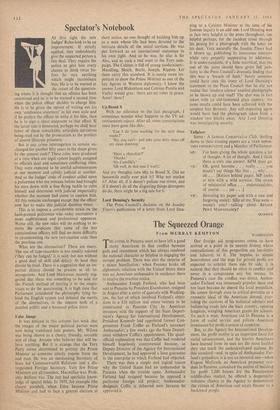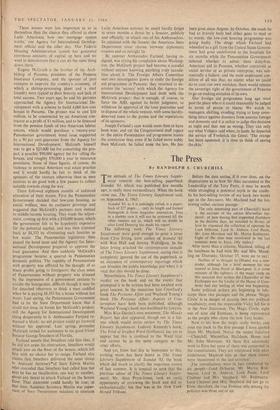The Squeezed Orange
From MURRAY KEMPTON
WASHINGTON
THE events in Panama seem to have left a good many Americans in that conflict between guilt and resentment which has always rendered the national character so helpless in engaging the servant problem. There was also the surprise of a minor humiliation : when Panama broke off diplomatic relations with the United States there was no American ambassador in residence there to receive the eviction notice.
Ambassador Joseph Farland, who had been sent to Panama by President Eisenhower, resigned in August after a series of quarrels with Washing- ton, the last of which involved Farland's objec- tions to a $10 million real estate venture to be constructed in Panama City by American investors with the support of the State Depart- ment's Agency for International Development, President Kennedy had appointed former Con- gressman Frank Coffin as Farland's successor Ambassador; a few weeks ago the State Depart- ment withdrew Coffin's appointment. The quasi- official explanation was that Coffin had rendered himself hopelessly controversial because, as Deputy Director of the Agency for International Development, he had approved a loan guarantee to the enterprise to which Farland had objected.
There was then a simple and logical reason why the United States had no ambassador in Panama when the trouble came. Ambassador Farland had resigned because he opposed a particular foreign aid project; Ambassador- designate Coffin is debarred now because he approved it.
Our foreign aid programme seems to have arrived at a point in its uneven history where contradictions of this proportion are inevitable and inherent in it. The impulse to simple benevolence and the urge for private profit are expected to cohabit there side by side; it is natural that they should be often in conflict and never ih a compromise any but uneasy. In Panama's case the conflict was direct. Ambas- sador Farland was immensely popular there and not least because he shored the local prejudices. He comes through even in critical portraits as a romantic ideal of the American abroad, over- ruling the cautions of his technical advisers and bulldozing roads into the back country, opening hospitals, wangling American grants for schools. To such a man, American aid to Panama is a form of social service and private American investment for profit a source of suspicion.
But, to the Agency for International Develop- ment, the profit motive is an important force for social advancement, and the lessons Americans have learned from its uses are the most fruitful they can teach the underdeveloped nations. By this standard—and, in spite of Ambassador Far- land's prejudices, it is not an immoral one—when Eugene McGrath, an American promoter resi- dent in Panama, conceived the notion of building for profit 1,200 houses for the Panamanian middle-class market, he offered a desperately- welcome chance to the Agency to demonstrate the virtues of American real estate finance to a backward people.
`Those houses were less important to us in themselves than the chance they offered to show Latin Americans how our mortgage system works,' one Agency for International Develop- ment official said the other day. `Our Federal Housing Administration system has generated enormous amounts of capital up here and we want to demonstrate that it can do the same thing down there.'
Eugene McGrath is the brother of the Arch- bishop of Panama, president of the Panama Insurance Company, and the sponsor of past ventures to improve the country's econorhy, of which a shrimp-processing plant and a steel foundry were typical in their bravery and lack of total success. Two years ago, he and his partners approached the Agency for International De- velopment with a scheme to build 4,000 low-cost houses in Panama. The project was to cost $10 million, to be constructed by an American con- tractor at a profit of $1 million, and to be financed from the pension funds of two American labour unions, which would purchase a twenty-year Panamanian government bond issue supported by a 90 per cent guarantee from the Agency for International Development. McGrath himself was to get a $25,000 fee for conceiving the pro- ject, a possible' $90,000 agency fee for telling the houses, and roughly $70,000 a year in insurance premiums. None of these figures, of course, do violence to normal American real estate practice and it would hardly be fair to think of the sponsors of the venture otherwise than as men anxious to do good with a few pauses tO collect suitable rewards along the way.
There followed eighteen months of enforced alteration of their dream. First the Panamanian Government decided that low-cost housing, as social welfare, was its exclusive province and suggested that McGrath's partners turn instead to middle-income housing. They made the adjust-, ment, coming up first with a $10,000 house, which the government felt to be hopelessly expensive for the potential market, and was then trimmed back to $8,333 by eliminating such luxuries as hot water. The Panamanian legislature then passed the bond issue and the Agency for Inter- national Development prepared to approve the loan guarantee. And then suddenly McGrath's programme became a quarrel in Panamanian domestic politics. The cupidity of Panamanians with property was afflicted by the thought of so many profits going to foreigners; the class sense of Panamanians without property was aroused by the impression of a government anxious to coddle the bourgeoisie, difficult though it may be for detached observers to think a man. coddled when he is paying $8,333 for a house without hot water. Last spring, the Panamanian Government had to let the State Department know that it could not issue its bonds for McGrath's project; still the Agency for International Development clung desperately to it. Ambassador Farland re- mained a block; no aid project could go forward Without his approval. Last spring, promoter McGrath turned for assistance to his good friend Senator George Smathers of Florida.
Farland asserts that Smathers told him that, if he did not cease his obstruction, Smathers would attack him on the floor of the Senate, which left him with no choice but to resign. Farland also claims that Si-slathers delivered the same threat to Assistant Secretary'of State Edwin Martin Who conceded that Smathers had called him but says he has no recollection, one way or another, about any threat to attack Farland on the Senate floor. That statement could hardly be true; at that time, Assistant Secretary Martin was super- visor of State Department missions to nineteen Latin American nations; he could hardly forget in seven months a threat by a Senator, publicly and officially, to attack one of his Ambassadors. In relations with the Senate, the American State Department must choose between diplomatic evasion and an outright lie.
By summer Ambassador Farland, having re- signed, was crying his complaints about Washing- ton; the McGrath project had become a scandal without anyone knowing anything truly scanda- lous about it. The Foreign Affairs Committee sent two investigators down to study the foreign aid programme in Panama; they returned to de- nounce the `secrecy' with which the Agency. for International Development had dealt with the McGrath project; that is enough, of course, to force the AID, against its better judgment, to withdraw its approval of the loan guarantee and to dispose of the whole venture, with some hardly- deserved costs to the purses and the reputations of its sponsors.
Joseph Farland's case would seem then to have been won; and yet the Congressional staff report on the entire Panamanian aid programme leaves the conviction that, even if he failed more nobly than McGrath, he failed none the less. He has been gone since August; by October, the roads he had so bravely built had either gone to mud or to weeds; the low-cost housing programme was going badly. The drugs which Farland had wheedled as a gift from the United States Govern- ment had gone undelivered to the hospitals for six months while the Panamanian Government debated whether to admit them duty-free. American aid to Panama, whether conceived as social service or as private enterprise, was sub- stantially a failure; and the most unpleasant con- dition of all was that, no matter what we could do to cure our own mistakes, there would remain the sovereign right of the government of Panama to go on making mistakes of its own.
Our foreign aid programme long ago went past the place where it could reasonably be judged in terms of praise or blame. We watch its managers, shifting, evading, trying to keep some- thing intact against disasters from sources foreign and domestic and it is unfair to judge this decision as right and that one as wrong. They can only say what Voltaire said when, in haste, he departed the service of Frederick the Great. The orange has been squeezed; it is time to think of saving the skin.'







































 Previous page
Previous page